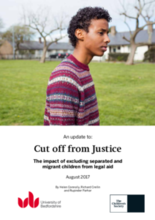Displaying 2401 - 2410 of 4424
MoSD and UNICEF convened a meeting with judges, legal experts and community-based organizations to discuss strategies and plans for moving away from institutional care and strengthening Jordan's foster care system.
"There have been well substantiated reports of trafficked children in orphanages for several years," writes Harold Goodwin in WTM's Responsible Tourism Blog.
In an interview with David Bevan of ABC Radio, child protection advocate Karen Flanagan, Save the Children, discusses the harms of orphanage tourism and funding as well as the Australian government's consideration of a ban on orphanage tourism.
Jayne Cravens reviews recent trends and developments in virtual volunteering, which offers volunteer opportunities that can be completed online. Links to numerous examples, articles, and resources are included.
This updated report presents the findings and recommendations from a study investigating the situation and experience of unaccompanied children in the UK's legal system.
UK government cuts to legal aid in 2012 have greatly impacted unaccompanied migrant children, who are now denied legal aid in non-asylum cases.
Japan's Health, Labor and Welfare Ministry has announced new targets for children in need of alternative care.
The Social and Health Management software (SOHEMA) Child Case Management System (CCMS), a new software system in Jamaica, will allow child protection officers to upload and track cases of children in the child protection system.
Despite good intentions, volunteers and donors from Australia and the larger international community are supporting orphanages separating children from their families. Australia is seeking to curb support for orphanages in countries like Cambodia, where the trafficking of children into orphanages is a common practice.
This article explores the perspectives and programme needs of transition service providers (institutions and the government) in preparing and supporting adolescent girls leaving institutional care in Harare, Zimbabwe.



